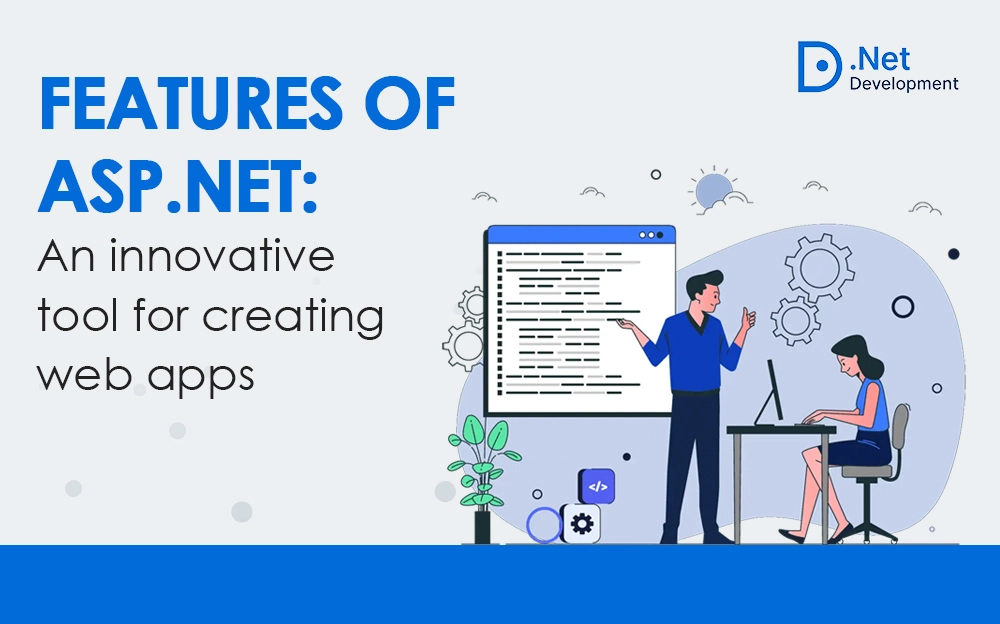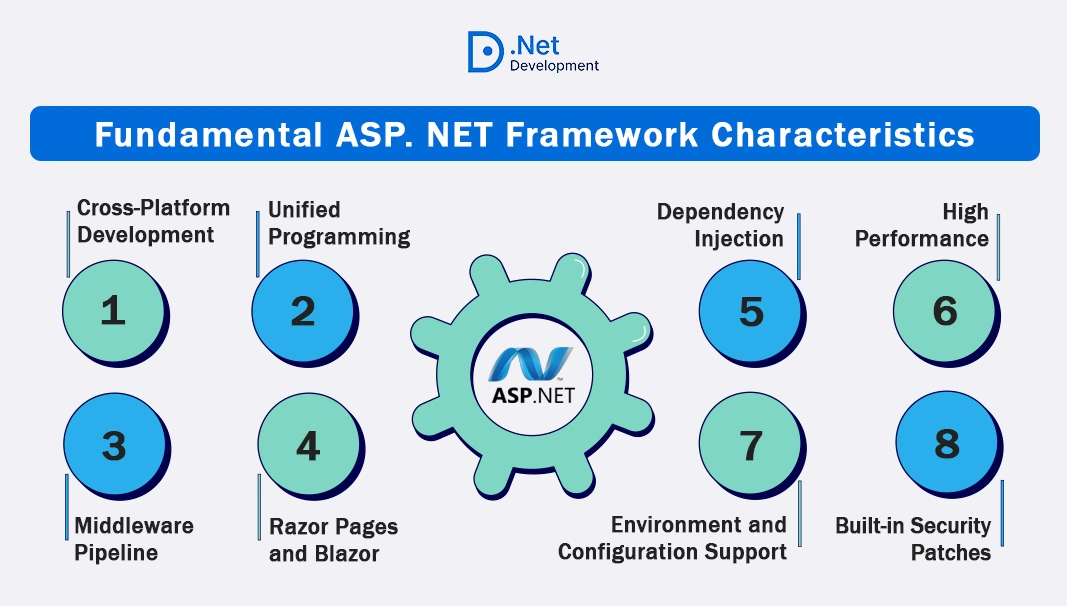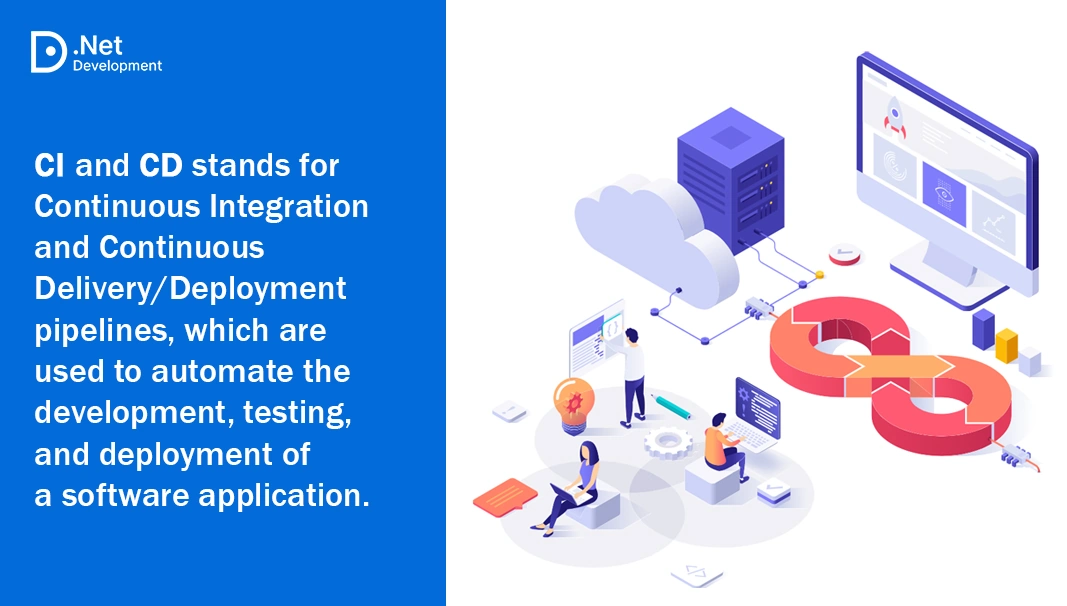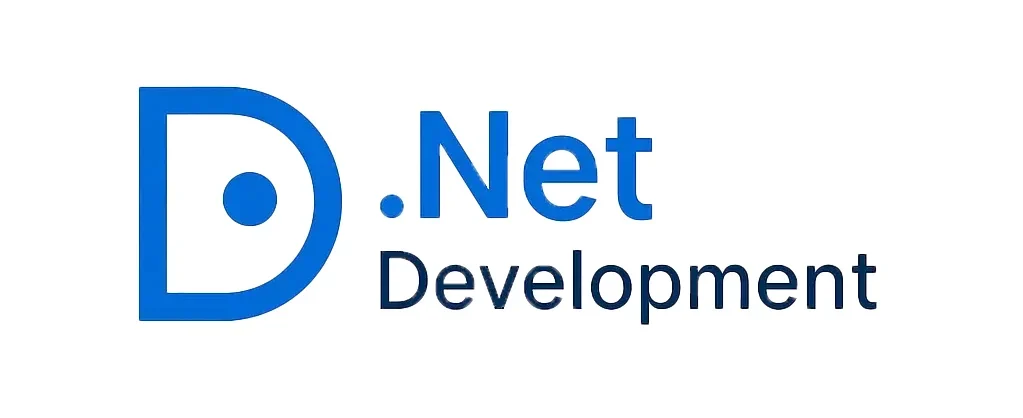Features of ASP.NET: An innovative tool for creating web apps

ASP.NET is a one-stop solution for creating an interactive website. Developed by Microsoft, it is used to produce dynamic, high-performance, and secure web applications. Covering a broad spectrum of uses, the ASP.NET framework matches all kinds of corporate demand. This strong tool allows cross-platform programming as well, thanks to several modules, features, and advantages. We will dissect ASP.NET’s characteristics and other pertinent elements in this post that enable very strong and efficient development.
ASP.NET and Its Features
Designed by Microsoft, ASP.NET is an open-source, cross-platform framework used in the design of upscale responsive websites and services. This structure supports several programming languages, including F#, VB.NET, and C#.
Important ASP.NET Server-Side Development Process Attributes Built using a backend development framework, a server guarantees improved security and faster performance.
Development across Platforms: Operating on Windows, Linux, and macOS, ASP.NET Core offers flexible deployment and support.
One of the most crucial aspects of an application is security, built-in. Strong security measures include authentication, authorization, anti-XSS, and CSRF protection abound.
High Performance & Caching: It supports several modules as well as outside third-party caching, offering the best performance and responsiveness.
Integrated with Visual Studio, modern development tools support Razor Pages, Tag Helpers, and dependency injection for effective development.
ASP.NET offers several advantages depending including the creation of a whole web application simply from these aspects.
Know more from this ASP .NET Development Guide
ASP.NET Development Mechanisms
The ASP.NET framework’s multiple development models to fit various project kinds are what make it so extensively used for application development. Among these are:
- Web Forms: Beginning users or applications with significant UI logic would find this UI development paradigm to be excellent.
- MVC Models: Among the extensively applied ASP.NET development models is MVC, or Model-View-Controller. It separates the features, which facilitates the management of challenging applications.
- Razor Pages: Designed as a lightweight, page-oriented paradigm, they streamline situations similar to content-based websites.
- Blazor: Often referred to as the frontend of a web page, this is utilized in interface creation. It replaces JavaScript by allowing full-stack web development on client and server using C# and .NET.
Whether a new application or modernizing legacy systems, the whole bundle of full-stack development fits any application.
Why should one choose ASP.NET for web development?
As noted, ASP.NET is a strong framework extensively applied in web development worldwide. Maintaining the performance and integrity of the web applications, it provides a set of libraries, modules, built-in security fixes, and many more characteristics. This framework is among the most sophisticated tools for building websites, so developers select it. Razor Pages, Blazor, MVC, and Web APIs all help to make the development extremely effective.
Available on several operating systems like Windows, macOS, Linux, etc., it simplifies cross-platform application development. Although many competing technologies with a significant market capitalization are available, many developers and businesses still take advantage of the ASP.NET framework. It makes the application quite load-efficient using a strong backend basis.
Fundamental ASP. NET Framework Characteristics

We are beginning with a strong awareness of the fundamental characteristics of the ASP.NET Framework. This whole tool, ASP.NET Framework or ASP.NET Core, guarantees security, boosts performance, and offers the most thorough, simplified development.
Integration of Platform Development
Appropriate for cross-platform development, the apps created with the ASP.NET framework are available on Windows, macOS, Linux, etc., on many running systems. This adaptability links it to contemporary deployment settings such as Docker, Kubernetes, cloud services like Microsoft Azure, AWS, and Google Cloud.
Unified Programming
Under one consistent framework, ASP.NET Core combines several development models, including MVC (Model-View-Controller), Web API, Razor Pages, and Blazor. Using the same tools and standards, developers today may create RESTful APIs, page-based apps, and whole client-server systems.
High Performance
Using APIs and packages helps to reduce the additional heavy code, thereby improving the general web application performance. The program performs flawlessly with the best route page transitions and data processing from loading time to obtaining data. By producing ideal binaries, the very sophisticated ASP.NET 9 framework improves performance.
Designed Dependency Injection
Dependency injection is a tool included in ASP.NET. Separating issues and minimizing hard-coded dependencies helps this function to simplify service configuration and increase maintainability.
Middleware Pipeline
Custom middleware pipelines enable ASP.NET’s HTTP requests to be processed. This lets net developers take short-circuit, intercept, or alter requests and responses as needed. Among the several applications middleware serves are authentication, logging, exception handling, static file serving, and more.
Razor Pages and Blazer
Page-based apps, whereby the frontend and backend logics are split, are developed using Razor Pages. ASP.NET also boasts Blazor as another capability. It lets C# rather than JavaScript, enable interactive web interfaces. Blazor supports WebAssembly-based client-side rendering as well as server-side one.
ASP.NET Protection Mechanisms
This is quite a crucial characteristic. The ASP.NET framework comes with several security layers covering protection. It provides data security APIs, HTTPS enforcement, cookie-based authentication, token-based authentication with OAuth2 and OpenID Connect, and protection against typical vulnerabilities such as Cross-Site Request Forgery (CSRF) and Cross-Site Scripting (XSS).
Environment and Configurations Support
Based on JSON files, environment variables, command-line arguments, and Azure Key Vault, this framework operates in a hierarchical configuration structure. The developers get simple access to all the dependencies and configurable parameters.
Logging and Diagnostics
It connects easily with cloud monitoring technologies like Azure Application Insights and also with outside libraries as Serilog, NLog.
ASP.NET is a one-stop solution for creating any kind of software program or web page since it comes with several more benefits. From security to an elegant user interface, this premium framework can meet every corporate need.
What Are The Applications of ASP.NET
ASP.NET is applied in many different sectors and companies thanks to its several capabilities. For any kind of project, its adaptability, great performance, and security aspects make it the perfect fit. Below are some main uses:
| Corporate Web Apps
Many big businesses build their needed systems—HR portals, project management tools, inventory control systems, ERP (Enterprise Resource Planning) software—using the ASP.NET framework. |
Online Shopping Platforms
ASP.NET makes a wonderful fit for the creation of a scalable, safe online store. Developers can design complete e-commerce solutions using built-in security features, connection with payment gateways, product catalogs, customer accounts, and transactions. |
CMS: Content Management Systems
ASP.NET will enable you to create bespoke Content Management Systems ( CMS ). Furthermore, accessible are some pre-built systems like DotNetNuke (DNN) and Umbraco. These solutions let companies properly and smoothly control their online content. |
| Real Time Applications
Build ASP.NET web real-time applications, including chat apps, live trading dashboards, collaborative tools, and online gaming platforms with SignalR. These kinds of applications require instantaneous server and client data synchronization. |
Healthcare, Finance, and Education
These represent the most often used ASP.NET framework apps. From banking to healthcare, it offers the creation of very effective management systems, like LMS, to control the workflow. Its scalability, dependability, and security qualify it for many kinds of commercial environments. |
Microservices and ASP.NET
ASP.NET offers great advantages for creating microservices. We can provide light-weight RESTful APIs or gRPC services fit for containerized settings. ASP.NET seamlessly connects with DevOps tools, cloud platforms, and service orchestration solutions like Kubernetes, in parallel with the current technology.
Microservices:
Modular architecture: Integration of modules makes it lightweight and flexible to incorporate just the required parts.
Support for Docker and Kubernetes: These capabilities help make it perfect for containerizing and orchestration.
REST AND gRPC APIs: It builds quick, effective levels of inter-service communication.
Safe and under control: Built-in security patches enable the ASP.NET applications created to have environmental configurations, authentication, and authorization.
Service health endpoints and ready-to-use diagnostics are part of monitoring and health checks.
Integration of several gateways and APIs is rather simple in the service discovery and API gateway. It goes nicely with Ocelot and Istio, among other tools.
DevOps and CI/CD Pipelines: ASP.NET

ASP.NET also supports DevOps methods and Continuous integration/continuous deployment (CI/CD) processes, among other things. Modern ASP.NET techniques include Azure DevOps, GitHub Actions, Jenkins, and others can be readily included by developers to automate builds, tests, and installations.
It helps to provide a rapid development cycle and deployment method. Having all such capabilities helps one to work with cloud-native settings and technologies.
Features of DevOps:
Integration of CI/CD Tool Tools: works using Jenkins, Azure DevOps, GitHub Actions.
Container-Ready: Supported from the box, Docker, and Kubernetes.
For simple management, use appsettings. {Environment}.json.
Health Checks & Telemetry: Track effortlessly performance, uptime, and logs.
Automate build and release pipelines for more rapid releases.
Know .NET Development Cost in detailed from this blog
The ASP.NET Framework’s Future
Microsoft developed the ASP.NET Framework in 2002; however, with time, it has changed, and today, numerous enterprises and companies make use of it. Its future seems bright with further improvements and enhancements. ASP.NET 9 marks a turning point on the road to ongoing success and market presence. Every upgrade speeds performance, lowers startup times, and more effectively supports cloud-native apps.
AOT (Ahead-of-Time) compilation is one of the most sophisticated tools in the ASP.NET 9 framework since it will enable the creation of smaller and faster binaries. Developers of multi-level API integrated web applications expect quite effective solutions. Moreover, this makes it appropriate for integration with frameworks for artificial intelligence and machine learning.
Click here for how to hire dedicated net developers
Conclusion
Understanding the depth of this framework depends on knowing the ASP.NET characteristics. It’s strong, versatile, future-ready processing that makes solid application development possible will always be remarkable. It enables developers to create safe, scalable, and high-performance apps by means of cross-platform development and support of integration with contemporary tools and cloud settings.
Using this sophisticated architecture, several software development firms are creating load-efficient, interesting user interfaces. These development strategies, with their legacy, will be applied by developers for their software projects going forward.
Frequently asked questions
- What are .NET Core features?
It is an open-source, cross-platform, robust application development framework that is used to develop highly efficient, modern, flexible, and secure applications without compromising on processing and loading time.
- What is the full form of ASP.NET Core?
ASP.NET Core stands for Active Server Pages Network Enabled Technologies Core. It was released in 2012 by Microsoft and provides the development of robust applications with complete frontend and backend processing. It is very powerful to build load-efficient backend logic that can handle large data processing.
- Is ASP.NET still used?
Yes, ASP.NET is still used, and developers will continue to use this framework for developing web pages. This is one of the most favourable ways to design and deploy web applications tailored for every business need. With continuous updates and modifications, ASP.NET is coordinating with the latest technologies and business requirements.
- What are the key features of C#?
C# is a programming language that offers strong typing, automatic memory management, and rich .NET libraries. It is used in cross-platform development, LINQ for easy data queries, async programming, and robust security. It has many features, including delegates, events, and multithreading, making it ideal for building scalable, efficient applications.
- What are ASP.NET MVC features?
It provides direct division of concerns in models, views, and controllers. It supports test-driven development, powerful routing for SEO-friendly URLs, full HTML control, asynchronous programming, built-in security, extensibility, and seamless integration with JavaScript frameworks, enhancing web app performance and maintainability.
- Why is ASP.NET Core faster?
ASP.NET Core is fast because it is a module-based development framework. It reduces the codebase by enabling the integration of various APIs and packages. It uses a high-performance Kestrel web server, supports asynchronous programming, and has a minimal request pipeline.
I am Manish Kumawat, co-founder of Fulminous Software, a top leading customized software design and development company with a global presence in the USA, Australia, UK, and Europe. Over the last 10+ years, I am designing and developing web applications, e-commerce online stores, and software solutions custom tailored according to business industries needs. Being an experienced entrepreneur and research professional my main vision is to enlighten business owners, and worldwide audiences to provide in-depth IT sector knowledge with latest IT trends to grow businesses online.

